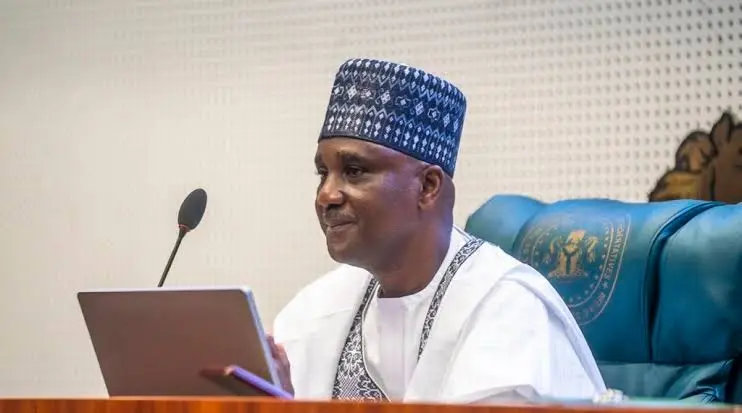All hands must be on deck to tackle climate change- Reps Speaker, Tajudeen

Speaker of the House of Representatives, Abbas Tajudeen, has made a call on government at all levels as well as corporations, civil society organisations, and individuals to take urgent steps against the growing climate problem across the globe.
Hon Tajudeen made the call Thursday while speaking at the forum on lifestyle for the environment during the ongoing 9th P20 Summit and G20 Parliamentary Forum in New Delhi, India – a summit which has other members of the Nigerian delegation including the Deputy President of the Senate, senator Jibrin Barau, amongst other parliamentarians in attendance and aims to give global governance a legislative character, increase political support for international agreements, and make sure that these agreements are properly translated into local reality.
According to the speaker, Nigeria, which is Africa’s most populous and diverse country, faces unique challenges as a result of climate change and while systemic reforms pushed by governments and powerful companies are necessary for effective mitigation, individual acts have a variety of benefits for resolving the climate catastrophe.
The Speaker advised parliamentarians to consider allocating funds for climate change mitigation and adaptation efforts during the budget process while noting that they could also hold governments accountable for their climate commitments and actions by effectively utilising the wide range of oversight tools and powers available to them and that parliaments could push for educational programmes and training on climate change at all levels.
This was as he noted that Nigeria is reorganising its Ministry of Education to address climate-related issues within educational institutions adequately.
In a statement by the Special Adviser on Media and Publicity to the Speaker, Musa Krishi, said, “Climate change impacts developing countries in various ways due to their greater vulnerabilities and lesser capacities to adapt… In the northern part of the country (Nigeria), increasing desertification has negatively affected farming, while unpredictable rainfall patterns have affected crop yields in the southern parts.
“A direct consequence of this is an economic strain, given that agriculture is a significant sector of Nigeria’s economy. Coastal areas, especially around the Niger Delta, face an increased risk of flooding due to rising sea levels and changing rainfall patterns.
“More so, Nigeria relies on hydroelectric power for a significant portion of its electricity, and variability in river flows often affects energy availability. Given these challenges, it is crucial for Nigeria, as with many developing countries, to address mitigation (reducing greenhouse gas emissions) and adaptation (preparing for and responding to the effects of climate change).
“The 10th House of Representatives Committee on Renewable Energy oversees national strategies to counter the effects of climate change and ensure that laws about all aspects of climate change are adequate and implemented effectively. Nigeria is committed to transitioning from fossil-based energy to renewable energy sources such as wind, solar, and hydropower to ensure sustainability,” he said recalling that the United Nations Environment Programme had reportedly estimated that if one billion individuals out of the global population of eight billion were to embrace environmentally friendly lifestyles, global carbon emissions could decrease by approximately 20 per cent.
While reiterating the fact that parliamentarians could play vital roles in the fight against climate change, Hon Tajudeen said the UNEP’s estimates underscored the transformative power of individual actions to mitigate climate change.
He said, “As elected representatives and policymakers, parliamentarians can play a crucial role in the fight against climate change. We have the power to influence, design, and implement measures that can mitigate the impacts of climate change and ensure a sustainable future.”
The speaker however, lauded the LiFE initiative for its focus on encouraging the adoption of sustainable lifestyles to tackle the challenges of environmental degradation and climate change while highlighting other interventions by the Nigerian National Assembly including the enactment of the HYPPADEC Establishment Act in 2010, which led to the creation of the Hydroelectric Power Producing Areas Development Commission to address ecological challenges from the operations of Hydroelectric Dams.
He said “the vital role that parliamentarians can play in supporting the ‘LiFE’ program is enormous and includes drafting, proposing and enacting legislation to regulate emissions, promote renewable energy and set environmental standards” while informing the forum that Nigeria passed the Climate Change Act in 2021 to chart a path toward low greenhouse gas emissions and sustainable growth.
“This legislation established the National Council on Climate Change and is the first comprehensive climate change legislation in West Africa. Moreover, Nigeria recently submitted its Nationally Determined Contribution Interim Report to the United Nations Framework Convention on Climate Change, demonstrating its commitment to reducing carbon emissions by 20 per cent unconditionally and 45 per cent with international support by 2030.”
The Speaker added that the Nigerian government, in January this year, adopted new Methane Guidelines that include mandatory measures for oil and gas companies to reduce methane emissions from the oil and gas sector, as well as the establishment of the Sovereign Green Bond Programme in 2017 following the Paris Agreement of 2015.
Other policies and activities of the Nigerian government to combat climate change, he said, included implementing rural electrification programs to extend access to clean energy in remote areas; sustained tree planting, and reforestation endeavours to combat deforestation and rehabilitate ecosystems, among others.
“The National Assembly consistently allocates budgetary resources to support these initiatives, which can serve as exemplars for addressing environmental degradation. Legislative interventions have cascaded to the sub-national level, where state legislatures are enacting legislation to address waste management and recycling, fostering responsible consumption and waste reduction.”







